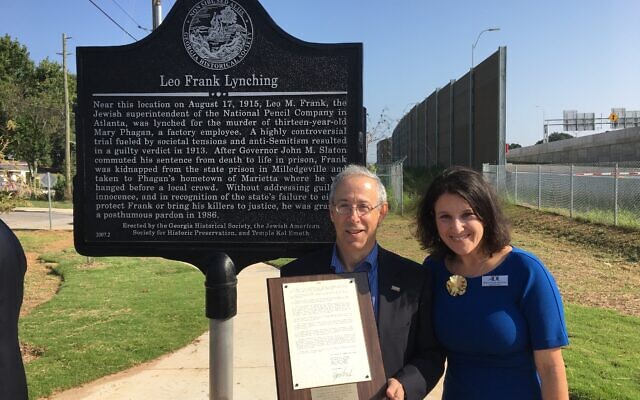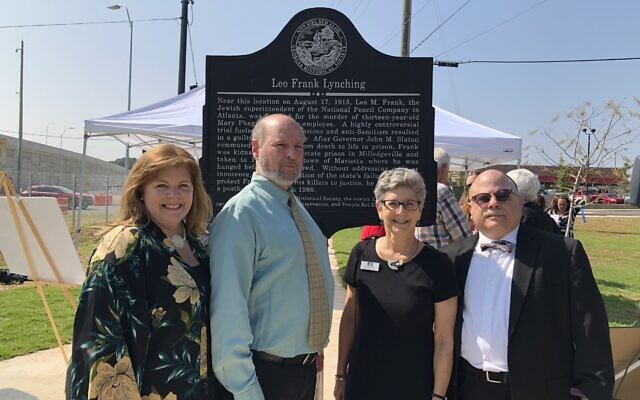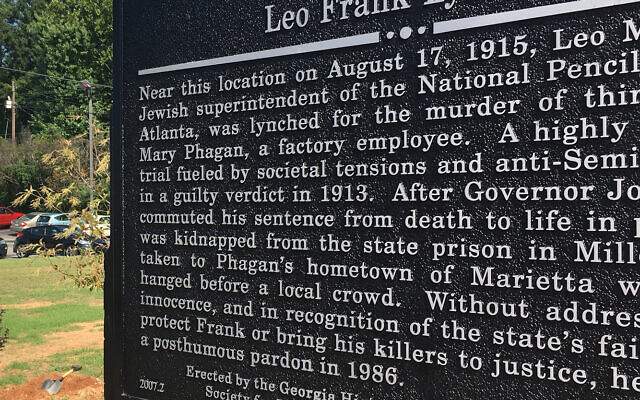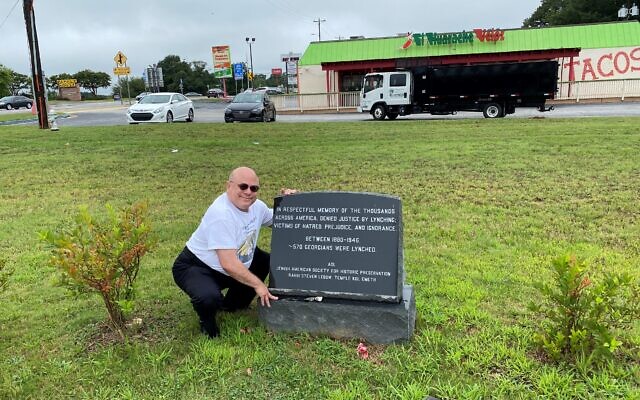The Story of Leo Frank Lives On
Memorials to Leo Frank and those who were lynched in Georgia are particularly important this year for reasons including rising antisemitism and the current civil rights debate.
Hang the Jew! Hang the Jew!
105 years ago, Leo Frank was brutally lynched by an angry mob whose raging antisemitism spilled over after Frank was wrongfully accused and convicted of murder. The Leo Frank trial occurred at a time when antisemitism was commonplace and public, with signs in storefronts that said, “No dogs, No Jews.” Frank’s horrific lynching became widely publicized, leading to the realization that things had to change and antisemitism could not be ignored.
Many years later, the Jewish American Society for Historic Preservation, with support from ADL, Rabbi Steve Lebow and many others, installed a Leo Frank Memorial in Marietta at the site of his lynching, and an Anti-Lynching Memorial to recognize the over 570 individuals who have been lynched in Georgia, brutal acts which stain our history.
“The anti-lynching memorial at the Leo Frank site acknowledges the injustice, the pain of thousands,” said Jerry Klinger, founder of the Jewish American Society for Historic Preservation. “It demands we join for the betterment of all.”

This is a particularly important year to recognize the anniversary and the significant legacy of lynching in Georgia for four primary reasons.
First, with the passing of the heroic Congressman John Lewis, many recognized the deep allyship that Lewis showed with the Jewish community. The Leo Frank memorial greatly illuminates this connection. When the Georgia Department of Transportation initially refused to allow the placement of the memorial on its original site, Congressman Lewis wrote an impassioned letter to the GDOT in which he said that the “Anti-Lynching Memorial is an important step towards healing for our community and honoring the work and sacrifice of countless generations to end racial and civil injustice in our great country.” Congressman Lewis understood the importance of Jewish and African American intertwined histories, especially in the South, and how living in the “beloved community” was being the best America possible.
Second, times are changing and there is important momentum right now in addressing our nation’s history of systemic oppression. As Rabbi Lebow explained, “The South has changed and is changing in many ways. In Marietta, we are prepared to deal with a difficult past in order to secure a better and finer future.” We have to recognize that past to chart our path to the future.
Which leads to the third reason why the Leo Frank Memorial continues to be incredibly relevant: antisemitism is still rampant, 105 years later. While it is not as publicly acceptable and commonplace as it was in the days of Leo Frank, Dr. Allison Padilla-Goodman of ADL explained, “we are still experiencing shocking levels of antisemitism and are continuously fighting back its normalization as we see antisemitism seeping into mainstream rhetoric and antisemitic incidents impacting people everywhere in their communities, in schools and in public places.”
ADL’s annual audit of antisemitic incidents showed a record number of antisemitic incidents in 2019, more than any other year in the audit’s 40-year history. In 2019, there was a 56 percent increase in antisemitic assaults, further proof that the legacy of Leo Frank still haunts us daily.
Finally, 2020 is also a notable year to recognize Georgia’s history of lynching and hatred with the Leo Frank story as a painful example because we have made a very important step forward in addressing this history: Georgia now has a hate crimes law that recognizes the tremendous impact of these horrible bias-motivated crimes.

The story of Leo Frank has always anchored the Jewish experience and commitment to eliminating hate crimes. That anchor has expanded in recent years with the vicious antisemitic massacres in Pittsburgh, Poway, Jersey City and Monsey. The Georgia Hate Crimes bill was truly a symbol of our future, as it was passed in passionate coalition through Hate Free Georgia with active commitment by many different communities, including the primary role of ADL, Georgia Equality and Georgia NAACP, among others, who came together to demand acknowledgement that all of our victimizations are experienced collectively and need to be formally addressed so that they don’t fester.
Leo Frank’s legacy lives on, but it moves forward towards justice and love.
Jerry Klinger is founder of the Jewish American Society for Historic Preservation, Rabbi Steve Lebow is spiritual leader of Temple Kol Emeth, and Allison Padilla-Goodman is vice president Southern division of ADL (Anti-Defamation League).
- Leo Frank
- Jewish American Society for Historic Preservation
- Rabbi Steve Lebow
- Anti-Defamation League
- Leo Frank Memorial
- Anti-Lynching Memorial
- marietta
- Jerry Klinger
- Congressman John Lewis
- Georgia Department of Transportation
- Allison Padilla-Goodman
- Georgia Hate Crimes bill
- Hate Free Georgia
- Georgia Equality
- Georgia NAACP
- Opinion
- Community





comments